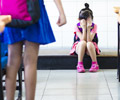A new review in the Journal of Adolescent Health shows how risky health behaviors in children and teens badly impacts academic performance.

Bradley and her colleagues suggest that improving health and academics should be viewed as a composite goal, not as separate goals by individual agencies. "Keep in mind there is no federal effort to address academics and health," Bradley added.
Researchers used data from 122 articles published between 1985 and 2011, examining the connection between academic achievements and at least one of the CDC-monitored health risk behaviors in young people age 6 to 18. 96.6 percent of the studies found a relationship between these health risk behaviors and academic performance, including grades, standardized test results and high school graduation.
"Anyone who works with children will probably not be surprised by the review's findings," noted study author Amy C. Greene, MSSW, MPH, of the National Association of Chronic Disease Directors in Atlanta. "How can we expect our children to stay on task and perform in school when they haven't eaten, have little or no opportunity for physical activity, are using psychoactive substances or re-experiencing violence? And at the same time, health care providers and agencies that deal with public health perceive that education is not their job and is taken care of by schools."
Linda M. Grant, M.D., associate professor of pediatrics at the Boston School of Medicine, noted, "Child health and academic achievement are two sides of a coin, but it takes both working together to provide child wellness for a community. As it is, we are a society of professionals who work in silos, which is important because this is where like minded people do evidenced-based work. But children and families walk between the silos and that's where they can get lost."
She said the review provides a new approach. "I have spent almost my entire career as a community-based adolescent medicine clinician as well as a consulting physician within a school department. I live with interconnectedness, but I am surprised that it has taken so long for this concept to gain traction. This review provides evidence that it is not just an impression, but a reality."
Advertisement
Source-Newswise









